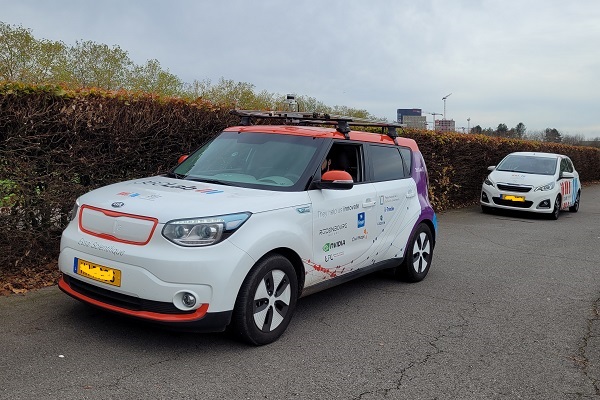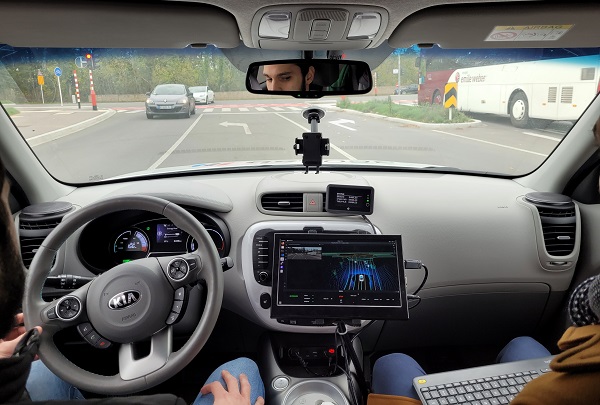 Credit: Jazmin Campbell / Chronicle.lu
Credit: Jazmin Campbell / Chronicle.lu
On Thursday morning, the Interdisciplinary Research Centre for Security, Reliability and Trust (SnT) of the University of Luxembourg invited members of the press (including Chronicle.lu) for a first ride aboard its experimental autonomous vehicle through Luxembourg-Kirchberg.
This was the first time an autonomous single-family car drove on the open road in Luxembourg in natural conditions. Journalists from different media outlets had the opportunity to hop in a self-driving KIA Soul EV, accompanied by a safety driver (who sat in front of the steering wheel without actually steering), for a ten-minute ride around the Kirchberg district.
This autonomous car is the test platform for navigation technologies and high-definition maps being researched at the University of Luxembourg's SnT 360Lab, led by Prof Raphaël Frank. Founded by Prof Frank in 2018, the 360Lab is the first thematic research laboratory focusing on smart mobility in the Grand Duchy and it serves as an umbrella to conduct strategic and collaborative research in the broader area of mobility innovation.
Prof Raphaël Frank was present on the day to discuss the demonstration and answer questions about autonomous navigation technology. He noted that self-driving cars have not yet proven as popular or as widespread as had been foreseen in recent years, although there are certain parts of the world such as Arizona in the United States (US) where these vehicles are more common. According to Prof Frank, three factors play a role in the success of autonomous vehicles: societal (i.e. if society accepts them), legal (in terms of liability in case something goes wrong) and technical factors.
The technology used in the 360Lab's car ranges between level 3 (conditional automation) and level 4 (high automation), with level 5 (full automation, i.e. no steering wheels) being the most advanced. "But we are far away from that", confirmed Prof Frank, who added that the process is gradual. He also explained that specific environments for self-driving cars may be easier than others, for instance motorways are often more predictable than urban settings where there are more "obstacles". On the other hand, urban settings can be less risky in terms of lower speeds and, as Prof Frank explained during one of the press rides, can make for more interesting research. Currently, the 360Lab's experimental autonomous car is restricted to Luxembourg-Kirchberg but its geographical scope may expand in future.
The car is fitted with six cameras as well as antennas and two computers in the boot; the latter are the "brains" of the autonomous vehicle and consist of one computer specialised in artificial intelligence (AI) and another more general-purpose computer. As Prof Frank demonstrated during the ride, the car is also fitted with a digital HD map of Luxembourg-Kirchberg (located where one might find a built-in Sat Nav in a traditional car). Indeed, the 360Lab's research includes developing HD maps of the region, which are the basis of autonomous navigation. The map for the demonstrated was completed in partnership with a San Francisco-based startup, Civil Maps, which is specialised in providing HD maps for automated mobility. Thanks to such technology, the car senses changing traffic lights and "obstacles" on the road in front of or next to it, such as pedestrians or other vehicles, and drives defensively - this can sometimes lead to lower speeds and precautionary braking.
The emphasis is on the software rather than the car itself; as Prof Frank confirmed to Chronicle.lu, this is an interdisciplinary platform with lots of robotics, communication systems, etc. which can be used in other projects and for events such as this press demonstration, for example to showcase the technology to the public, as well as encourage young people who may be interested in studying robotics or similar subjects.









